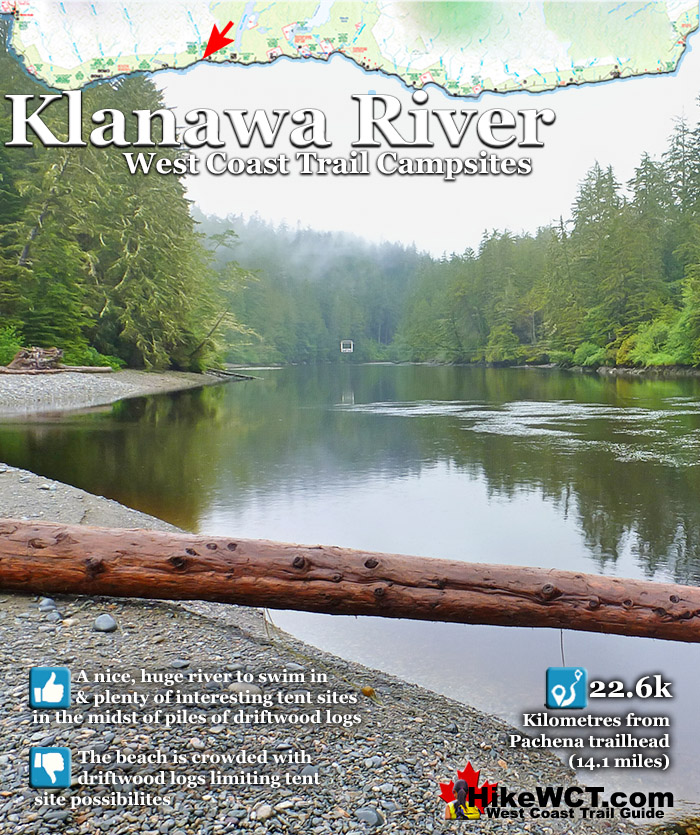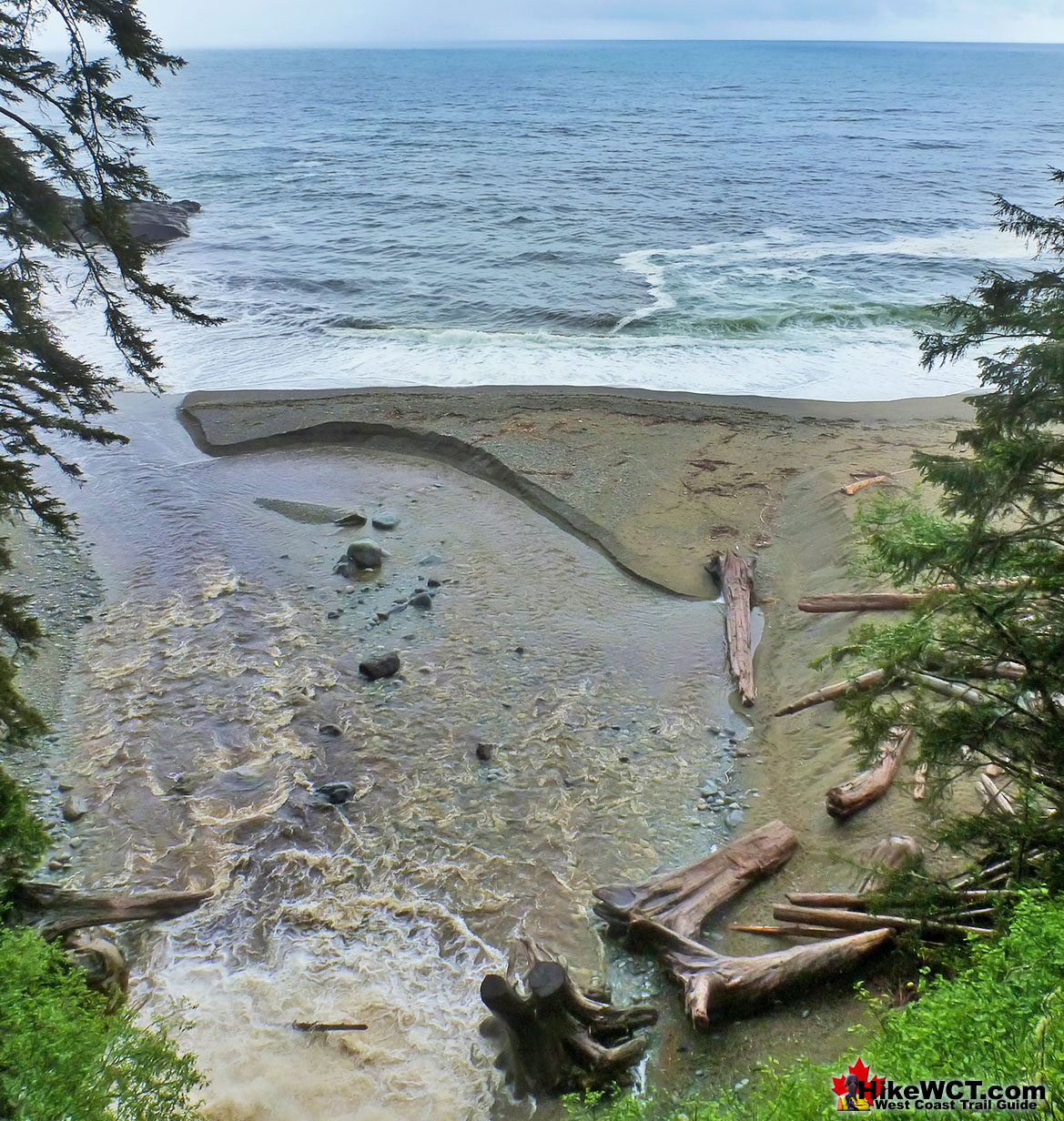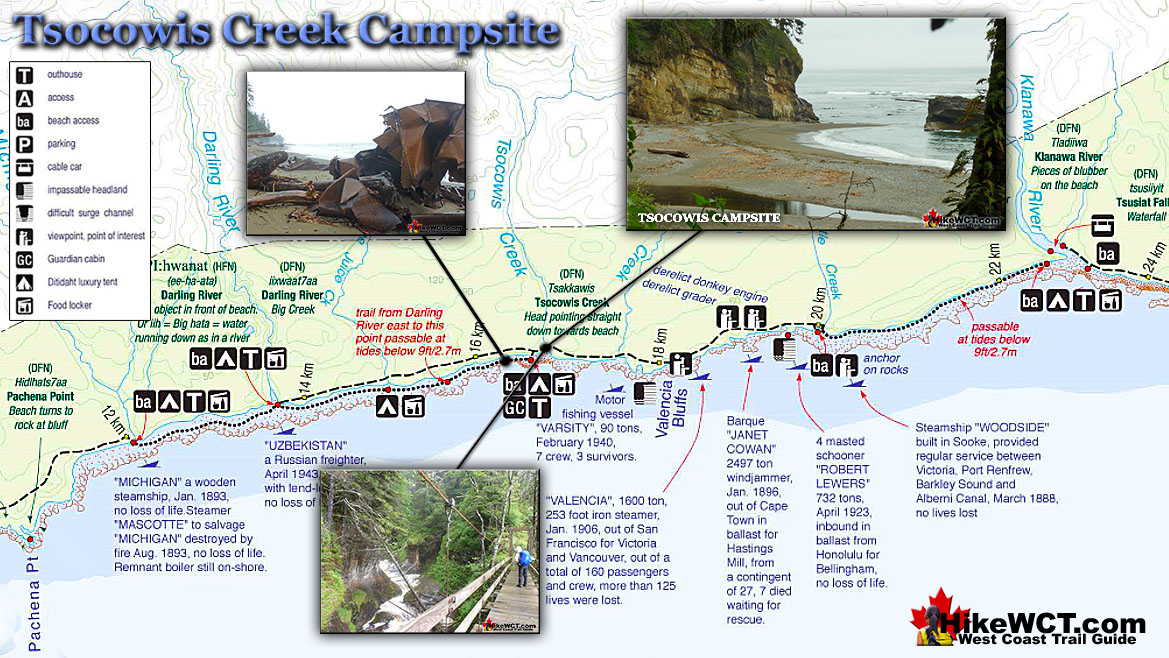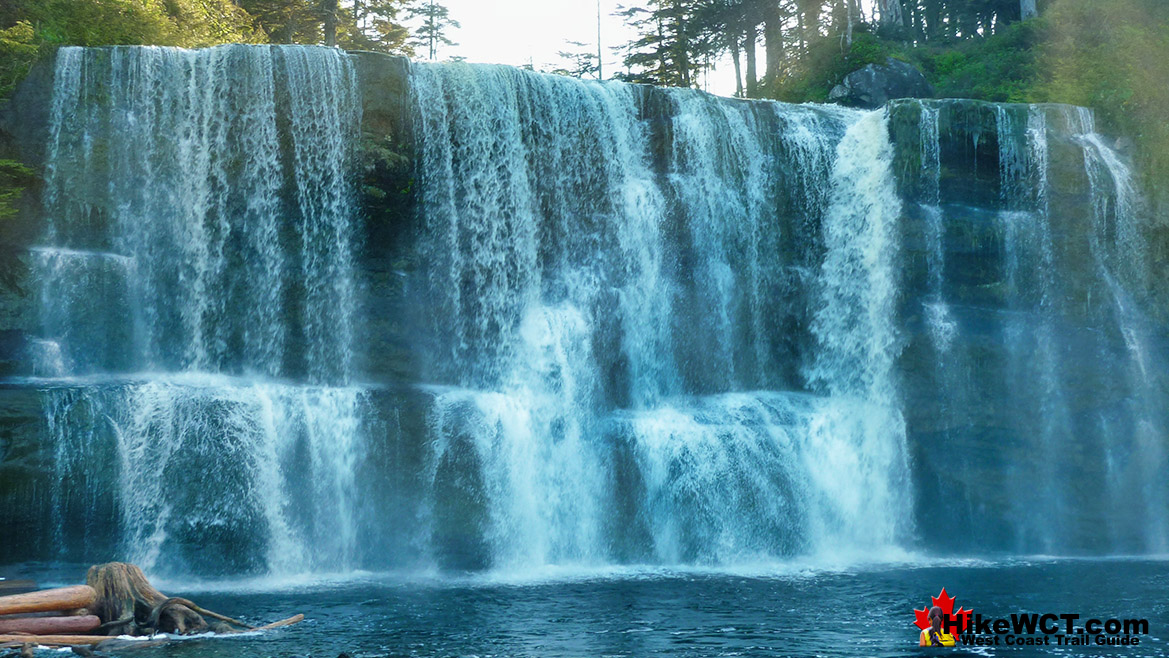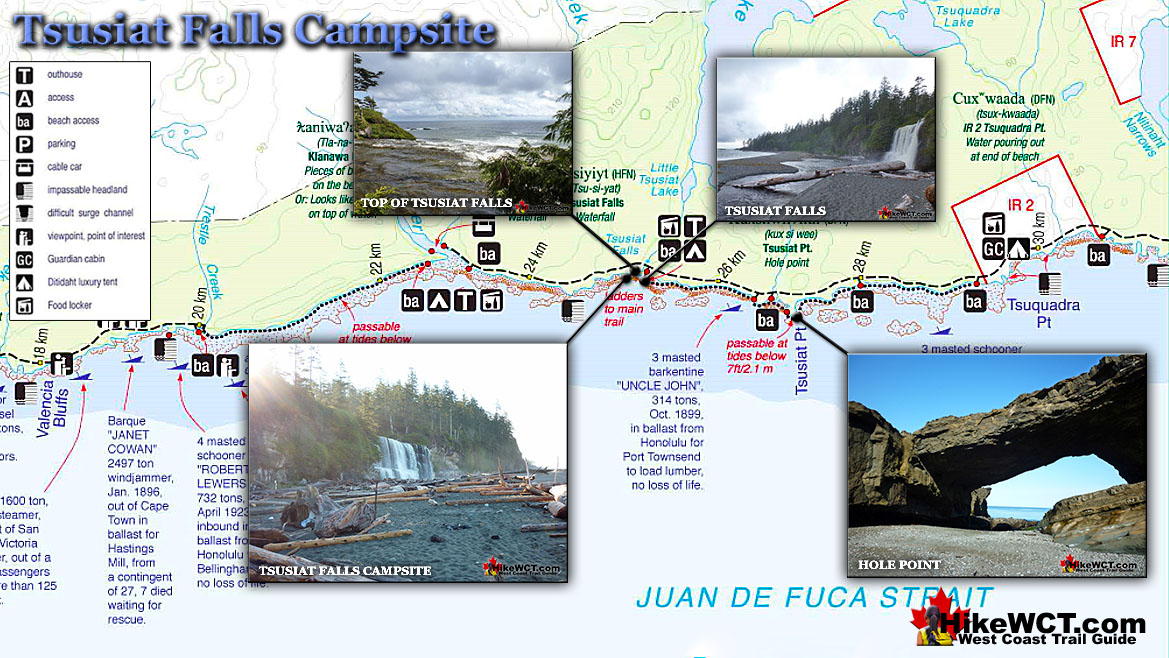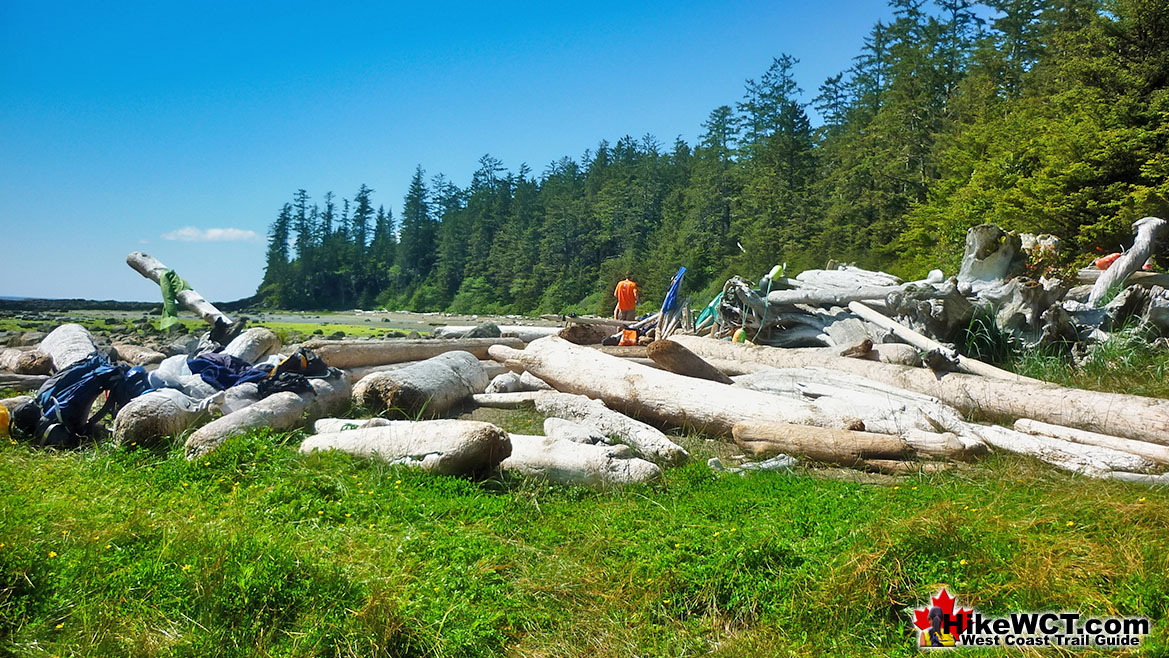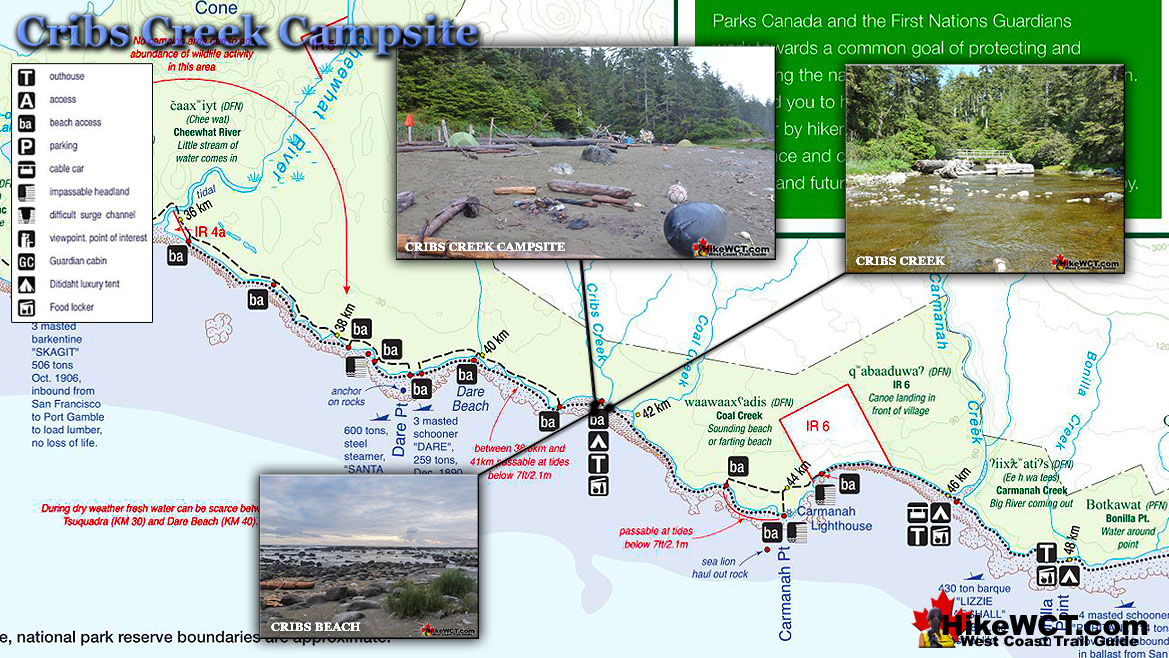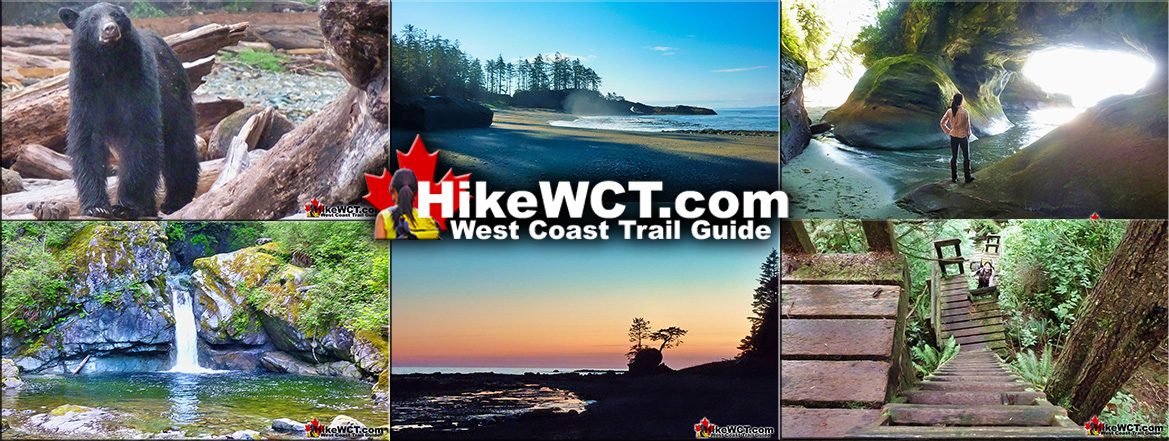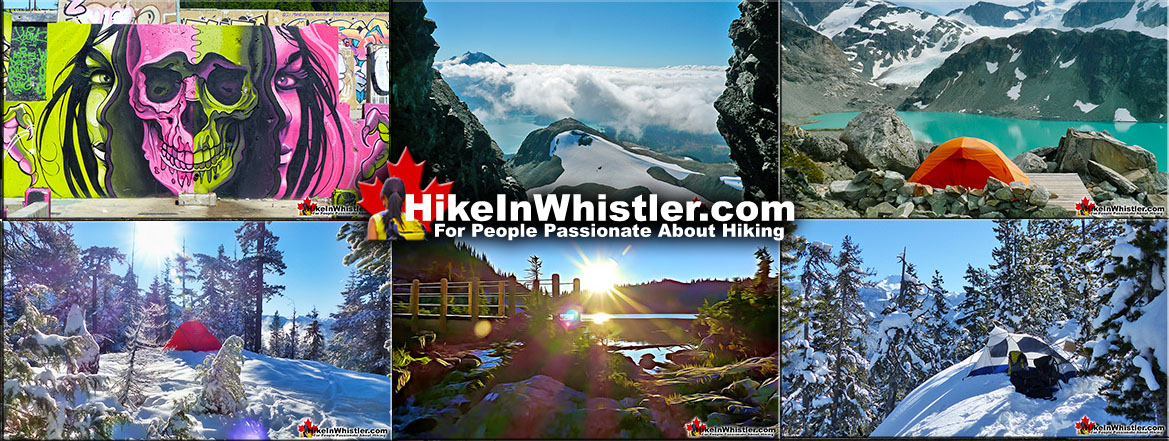![]() The campsite at Klanawa River is quite nice because of its lovely, swimmable river, expansive beach and serenity relative to other West Coast Trail campsites.. Though the beach is a thick, tangle of driftwood, you can still manage to find cleared areas perfect for a tent. Klanawa River is just a couple kilometres from Tsusiat Falls. Tsusiat Falls is pretty impressive and hardly any West Coast Trail hikers don't camp there.
The campsite at Klanawa River is quite nice because of its lovely, swimmable river, expansive beach and serenity relative to other West Coast Trail campsites.. Though the beach is a thick, tangle of driftwood, you can still manage to find cleared areas perfect for a tent. Klanawa River is just a couple kilometres from Tsusiat Falls. Tsusiat Falls is pretty impressive and hardly any West Coast Trail hikers don't camp there.
 Lots of great tent sites to choose from
Lots of great tent sites to choose from Far less busy than other WCT campsites
Far less busy than other WCT campsites Klanawa River is wide and deep
Klanawa River is wide and deep A campfire along the river is amazing
A campfire along the river is amazing Good tent sites in the forest as well
Good tent sites in the forest as well Cable car crossing is very fun
Cable car crossing is very fun Large beach & lots to explore along it
Large beach & lots to explore along it Jump in the river steps from your tent!
Jump in the river steps from your tent! Rocky shoreline is not as nice as sand
Rocky shoreline is not as nice as sand Other WCT beaches tend to be prettier
Other WCT beaches tend to be prettier
West Coast Trail Campsites
![]() Michigan Creek at 12km
Michigan Creek at 12km ![]() Darling River at 14km
Darling River at 14km ![]() Orange Juice Creek at 15km
Orange Juice Creek at 15km ![]() Tsocowis Creek at 16.5km
Tsocowis Creek at 16.5km ![]() Klanawa River at 23km
Klanawa River at 23km ![]() Tsusiat Falls at 25km
Tsusiat Falls at 25km ![]() Cribs Creek at 42km
Cribs Creek at 42km ![]() Carmanah Creek at 46km
Carmanah Creek at 46km ![]() Bonilla Creek at 48km
Bonilla Creek at 48km ![]() Walbran Creek at 53km
Walbran Creek at 53km ![]() Cullite Cove at 58km
Cullite Cove at 58km ![]() Camper Bay at 62km
Camper Bay at 62km ![]() Thrasher Cove at 70km
Thrasher Cove at 70km
This leaves few people at Klanawa River. Beautiful beach and a wonderfully huge river, the Klanawa River campground is fantastic. And because it is close to the super popular Tsusiat Falls campground it is often quiet and serene. Also, the main trail runs to the cable car crossing which diverts the crowds away. At Klanawa River you will find the water flowing past wide and slow. The river is deep enough to dive into from the riverbank. Which is the best way to get in as it is always surprisingly cold. There are several nice places in the morass of tangled driftwood logs to put up a tent. This gives you a nice feeling of having partial walls and you are never more than a metre away from a log to sit on. In the forest you will find a few more, very nice and also serene feeling clearings for tents. Always with a perfect little fire ring in the centre and sometimes with log furniture surrounding. It is hard to say where is better for your tent, in the wild, deep forest or the wild, driftwood scattered beach. The forest is a bit more cozy feeling and especially suited for a campfire in the forest. The beach, however has the benefit of a perfectly smooth, sand surface under your tent and the ever present river and ocean view.
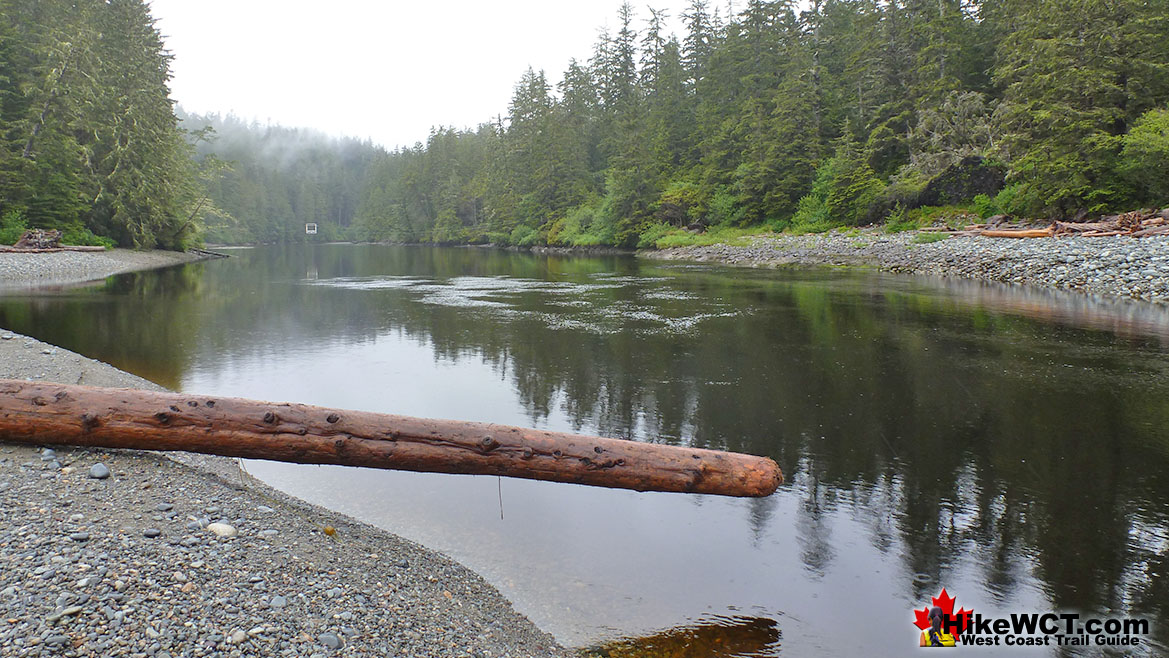
Klanawa River Campsite on the West Coast Trail
You have the same amenities at Klanawa River as you do at most other West Coast Trail campsites. Outhouses and animal proof food boxes. The water from Klanawa River is nice, clean and just steps away. Beware of skinny dipping in the river, the trail runs on the opposite side of the river behind a narrow band of trees! Possibly the most endearing feature of the campsite at Klanawa River is how beautifully quiet it is. Nobody camps here and everyone camps at the nearby Tsusiat Falls. Almost every hiker passes by without even a look at the beach. Camping here one night is recommended before or after a night at Tsusiat Falls.
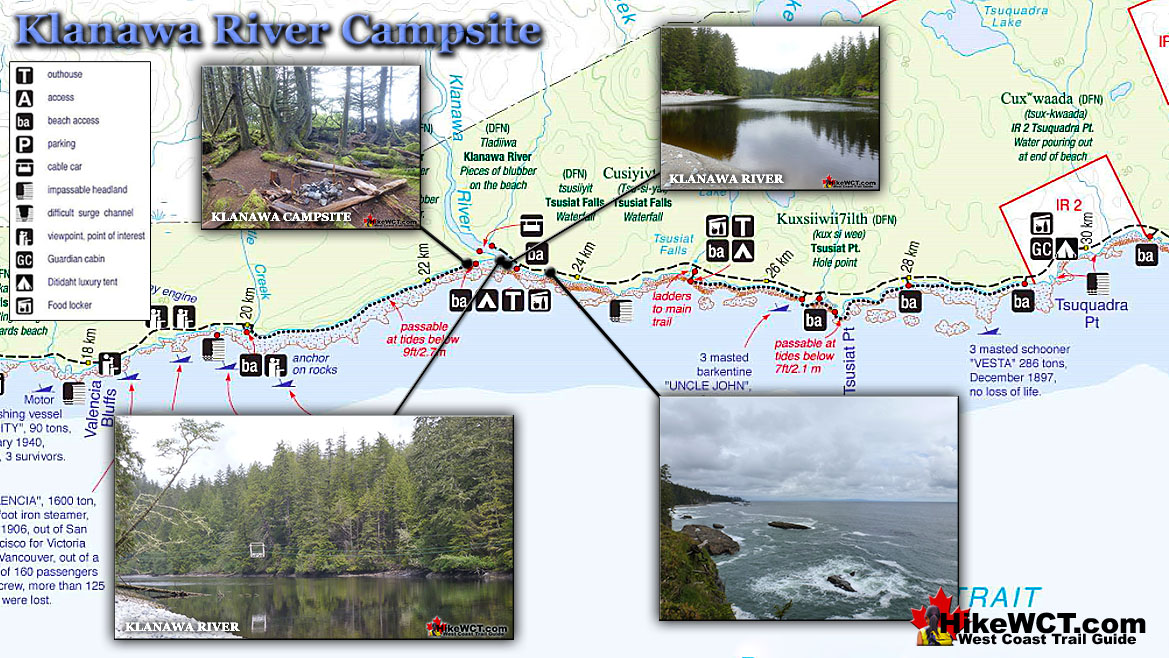
Shipwrecks Near Klanawa River
The Janet Cowan Shipwreck at 19km
![]() The Janet Cowan was named after the maiden name of the wife of the first owner. Unlike most other shipwrecks in the Graveyard of the Pacific, a good record of the ship as well as at least a couple photographs of her still exist. The Janet Cowan sailed from Cape Town on September 11th, 1895, bound for Royal Roads(near Victoria) on Vancouver Island. With 1100 tons of ballast and a crew of 29. The long voyage went very well until the evening of December 30th, 1895. Approaching Juan de Fuca Strait, under easy sail and with moderate weather, attempts were made to signal for a tug or pilot. They received no response. With daylight gone, she was sailing blind into the Graveyard of the Pacific. The captain decided to wait for daylight before sailing further. Just after 7pm the wind shifted suddenly and steadily increased into a gale. The Janet Cowan was brought around and attempted to run out for an offing to wait out the storm. At 845pm, Cape Flattery Lighthouse was spotted four or five miles away. The weather continued to worsen, with a violent gale blowing, heavy seas and thick snow falling, the Captain worried that their repeated wearing(a sailing technique of turning through the wind to shift the wind from one side of the boat to the other), would cause them to lose ground. This agonizing battle went on in brutal darkness as they charted their position based on their last sight of Cape Flattery and estimated speed. They pinpointed their position to be about seven miles off Vancouver Island, with the time now being well after midnight. Just before 1am, the second mate reported land on the starboard bow. The crew rushed to steer away, however the ship was caught in the trough of the sea and still inching towards the shore. At 130am the Janet Cowan was perilously inside the outside breakers and unable to escape. The ship was swung broadside on, with her head to the westward and the seas breaking over her fore and aft, she crashed into the shore.
The Janet Cowan was named after the maiden name of the wife of the first owner. Unlike most other shipwrecks in the Graveyard of the Pacific, a good record of the ship as well as at least a couple photographs of her still exist. The Janet Cowan sailed from Cape Town on September 11th, 1895, bound for Royal Roads(near Victoria) on Vancouver Island. With 1100 tons of ballast and a crew of 29. The long voyage went very well until the evening of December 30th, 1895. Approaching Juan de Fuca Strait, under easy sail and with moderate weather, attempts were made to signal for a tug or pilot. They received no response. With daylight gone, she was sailing blind into the Graveyard of the Pacific. The captain decided to wait for daylight before sailing further. Just after 7pm the wind shifted suddenly and steadily increased into a gale. The Janet Cowan was brought around and attempted to run out for an offing to wait out the storm. At 845pm, Cape Flattery Lighthouse was spotted four or five miles away. The weather continued to worsen, with a violent gale blowing, heavy seas and thick snow falling, the Captain worried that their repeated wearing(a sailing technique of turning through the wind to shift the wind from one side of the boat to the other), would cause them to lose ground. This agonizing battle went on in brutal darkness as they charted their position based on their last sight of Cape Flattery and estimated speed. They pinpointed their position to be about seven miles off Vancouver Island, with the time now being well after midnight. Just before 1am, the second mate reported land on the starboard bow. The crew rushed to steer away, however the ship was caught in the trough of the sea and still inching towards the shore. At 130am the Janet Cowan was perilously inside the outside breakers and unable to escape. The ship was swung broadside on, with her head to the westward and the seas breaking over her fore and aft, she crashed into the shore.
Janet Cowan shipwreck continued here...
The Robert Lewers Shipwreck at 20km
![]() The Robert Lewers was a 185 foot, four masted schooner of 732 tons, built in Port Blakely, Washington in 1889. She was wrecked just past kilometre 19 on the West Coast Trail, just half a kilometre from the Janet Cowen shipwreck, and less than two kilometres from the Valencia shipwreck. The Robert Lewers entered the Graveyard of the Pacific on the 11th of April, 1923. The ship was heading for Bellingham, Washington in ballast from Honolulu with a crew of 14. The circumstances of how Robert Lewers became wrecked on this shore is a depressing tale of unfortunate mishaps. As she entered Juan de Fuca Strait she found little wind and was forced to wait for a tug boat. A tug boat finally arrived to tow her into port. While passing the hawser line from the tug, it became tangled in the masts and rigging, tearing away the Robert Lewers jib boom and head gear. Another attempt was made with hopeful success, until the tow rope snapped. In the confusion, the tug hit a rock and was forced to limp back to Seattle for repairs. Through this ordeal the ship creeped perilously close to shore so the port anchor was released. Moments later the stern of the ship was dragging along the bottom. As the situation became desperate a call was sent out for another tug. An hour and a half passed, waiting for rescue as the ship continued to grind on the reef. When the second tug arrived, it could not get in close enough to attach a line. The wind was picking up so the captain decided to pull the anchor and try to sail out. The wind was far too weak to pull the massive ship away from the rocks and she fell broadside on the beach. The crew abandoned ship and the Robert Lewers remained, battered by waves and in the next few hours, she broke in two and became a permanent part of the Graveyard of the Pacific just offshore of what would later become the West Coast Trail.
The Robert Lewers was a 185 foot, four masted schooner of 732 tons, built in Port Blakely, Washington in 1889. She was wrecked just past kilometre 19 on the West Coast Trail, just half a kilometre from the Janet Cowen shipwreck, and less than two kilometres from the Valencia shipwreck. The Robert Lewers entered the Graveyard of the Pacific on the 11th of April, 1923. The ship was heading for Bellingham, Washington in ballast from Honolulu with a crew of 14. The circumstances of how Robert Lewers became wrecked on this shore is a depressing tale of unfortunate mishaps. As she entered Juan de Fuca Strait she found little wind and was forced to wait for a tug boat. A tug boat finally arrived to tow her into port. While passing the hawser line from the tug, it became tangled in the masts and rigging, tearing away the Robert Lewers jib boom and head gear. Another attempt was made with hopeful success, until the tow rope snapped. In the confusion, the tug hit a rock and was forced to limp back to Seattle for repairs. Through this ordeal the ship creeped perilously close to shore so the port anchor was released. Moments later the stern of the ship was dragging along the bottom. As the situation became desperate a call was sent out for another tug. An hour and a half passed, waiting for rescue as the ship continued to grind on the reef. When the second tug arrived, it could not get in close enough to attach a line. The wind was picking up so the captain decided to pull the anchor and try to sail out. The wind was far too weak to pull the massive ship away from the rocks and she fell broadside on the beach. The crew abandoned ship and the Robert Lewers remained, battered by waves and in the next few hours, she broke in two and became a permanent part of the Graveyard of the Pacific just offshore of what would later become the West Coast Trail.
Robert Lewers shipwreck continued here...
The Woodside Shipwreck at 20.2km
![]() Just past the 20 kilometre mark of the West Coast Trail you will find an anchor of the Woodside on the beach. The Woodside, an 87 foot long steamer built in Sooke, BC in 1878. The Woodside provided regular service between Victoria, Port Renfrew, Barkley Sound(sometimes spelled Barclay Sound), and the Alberni Canal. On March 12th, 1888, the Woodside lost her rudder and drifted into the rock shelf in front of Trestle Creek. Just past the 20 kilometre mark on the West Coast Trail, the anchor of the Woodside still sits in the middle of the beach. The ship was a total loss, disintegrating over the years with little left but the hauntingly vivid reminder of the wreck, laying rusting on the beach. The improbably located anchor on the beach is a stunning representation of how cool the West Coast Trail is. Emerge from the deep forest and difficult trail, to a desolate feeling, rocky coastline with a huge anchor left here from a shipwreck that happened over a century ago. Extraordinary!
Just past the 20 kilometre mark of the West Coast Trail you will find an anchor of the Woodside on the beach. The Woodside, an 87 foot long steamer built in Sooke, BC in 1878. The Woodside provided regular service between Victoria, Port Renfrew, Barkley Sound(sometimes spelled Barclay Sound), and the Alberni Canal. On March 12th, 1888, the Woodside lost her rudder and drifted into the rock shelf in front of Trestle Creek. Just past the 20 kilometre mark on the West Coast Trail, the anchor of the Woodside still sits in the middle of the beach. The ship was a total loss, disintegrating over the years with little left but the hauntingly vivid reminder of the wreck, laying rusting on the beach. The improbably located anchor on the beach is a stunning representation of how cool the West Coast Trail is. Emerge from the deep forest and difficult trail, to a desolate feeling, rocky coastline with a huge anchor left here from a shipwreck that happened over a century ago. Extraordinary!
Woodside shipwreck continued here...
The Uncle John Shipwreck at 26.2km
![]() The Uncle John was a 138 foot, three masted barkentine of 314 tons. Built in Eureka, California in 1881 and wrecked one kilometre east of Tsusiat Falls on the West Coast Trail. She was inbound in ballast from Hololulu, heading to Port Townsend. Owing to awful weather and heavy seas, the crew was unable to obtain any sights. Upon hearing breakers, she slowed and drifted into "an immense flat rock", which the ship became lodged against. Unable to launch a boat, the crew was forced to spend the night on the unmovable ship. When daylight finally arrived, the crew was able to make their escape to shore. The Uncle John continued to get pounded against the rock shelf until she was breaking apart. Her final resting place on the Graveyard of the Pacific is just down the beach from Hole In the Wall on the West Coast Trail.
The Uncle John was a 138 foot, three masted barkentine of 314 tons. Built in Eureka, California in 1881 and wrecked one kilometre east of Tsusiat Falls on the West Coast Trail. She was inbound in ballast from Hololulu, heading to Port Townsend. Owing to awful weather and heavy seas, the crew was unable to obtain any sights. Upon hearing breakers, she slowed and drifted into "an immense flat rock", which the ship became lodged against. Unable to launch a boat, the crew was forced to spend the night on the unmovable ship. When daylight finally arrived, the crew was able to make their escape to shore. The Uncle John continued to get pounded against the rock shelf until she was breaking apart. Her final resting place on the Graveyard of the Pacific is just down the beach from Hole In the Wall on the West Coast Trail.
Uncle John shipwreck continued here...
The Vesta Shipwreck at 29km
![]() At about 29 kilometres on the West Coast Trail you will pass the Vesta shipwreck. This 3 masted schooner of 286 tons was wrecked here on November 10th, 1897. This 128 foot long sailing ship was primarily used to ship lumber to California. The Vesta was inbound from California in ballast to Port Blakely Mills on Bainbridge Island, Washington. The Vesta wrecked at 430am on the 10th of November and was carried so high on the beach as to find her masts in the trees. She had overrun her position due to stormy, foggy weather and the unaccounted for current that brought so many ships to a tragic end in the Graveyard of the Pacific. All of the Vesta's crew of 8 men survived and were able to row to safety and rescue once the storm eased enough to safely travel. The Vesta, owing to its resting place high on the beach, remained there for several years. Often used by lineman seeking shelter, she was often noted by passing ships and used as a landmark. Eventually the hulk was burned in order to salvage the metal fastenings. Some metal parts of the Vesta can still be found today on the spot where she rested for so long. One of her anchors still lies buried in the sand and revealed occasionally by winter storms.
At about 29 kilometres on the West Coast Trail you will pass the Vesta shipwreck. This 3 masted schooner of 286 tons was wrecked here on November 10th, 1897. This 128 foot long sailing ship was primarily used to ship lumber to California. The Vesta was inbound from California in ballast to Port Blakely Mills on Bainbridge Island, Washington. The Vesta wrecked at 430am on the 10th of November and was carried so high on the beach as to find her masts in the trees. She had overrun her position due to stormy, foggy weather and the unaccounted for current that brought so many ships to a tragic end in the Graveyard of the Pacific. All of the Vesta's crew of 8 men survived and were able to row to safety and rescue once the storm eased enough to safely travel. The Vesta, owing to its resting place high on the beach, remained there for several years. Often used by lineman seeking shelter, she was often noted by passing ships and used as a landmark. Eventually the hulk was burned in order to salvage the metal fastenings. Some metal parts of the Vesta can still be found today on the spot where she rested for so long. One of her anchors still lies buried in the sand and revealed occasionally by winter storms.
Vesta shipwreck continued here...
![]() Janet Cowan at 19k
Janet Cowan at 19k ![]() Robert Lewers at 20k
Robert Lewers at 20k ![]() Woodside at 20.2k
Woodside at 20.2k ![]() Uncle John at 26.2k
Uncle John at 26.2k ![]() Vesta at 29k
Vesta at 29k
More West Coast Trail Campsites
Tsocowis Creek Campsite at 16.5km
![]() The Tsocowis Creek campsite at 16.5k has a decent beach with an excellent water source. There is plenty of room for tents along the beach amongst the driftwood logs. You have the same amenities here as other West Coast Trail campsites such as deluxe outhouses and animal proof food storage boxes. Tsocowis is home to one of the West Coast Trail guard cabin's. In 1940 the survivors of the Varsity shipwreck survived by crawling their way to the shelf below what is now called Valencia Bluffs. They now found themselves on a steep shelf that they could not climb. Out of the wreckage they managed to survive exposure and construct a ladder up the cliff and found the trail that hikers now call the West Coast Trail. The three survivors made their way to Tsocowis Creek and found the Tsocowis cabin occupied by lineman who fortunately was there. The three were later picked up from Tsocowis Beach. Today the shipwreck's huge metal winch rusts in a crevice at the foot of Valencia Bluffs. Hikers tend to pass this campsite and push on to the end of the trail(or the next campsite if heading south). Everybody it seems camp at Tsusiat Falls or Klanawa River. Both less than 9 kilometres further south. Tsocowis Creek is an entry or exit point from the beach trail and there is an alternate trail that runs through the forest north to Darling River. The beach route seems far better all around however, and much easier too as you don't get slowed by hiking on sand. Still, walking along the Pacific Ocean's Graveyard of the Pacific is always something special.
The Tsocowis Creek campsite at 16.5k has a decent beach with an excellent water source. There is plenty of room for tents along the beach amongst the driftwood logs. You have the same amenities here as other West Coast Trail campsites such as deluxe outhouses and animal proof food storage boxes. Tsocowis is home to one of the West Coast Trail guard cabin's. In 1940 the survivors of the Varsity shipwreck survived by crawling their way to the shelf below what is now called Valencia Bluffs. They now found themselves on a steep shelf that they could not climb. Out of the wreckage they managed to survive exposure and construct a ladder up the cliff and found the trail that hikers now call the West Coast Trail. The three survivors made their way to Tsocowis Creek and found the Tsocowis cabin occupied by lineman who fortunately was there. The three were later picked up from Tsocowis Beach. Today the shipwreck's huge metal winch rusts in a crevice at the foot of Valencia Bluffs. Hikers tend to pass this campsite and push on to the end of the trail(or the next campsite if heading south). Everybody it seems camp at Tsusiat Falls or Klanawa River. Both less than 9 kilometres further south. Tsocowis Creek is an entry or exit point from the beach trail and there is an alternate trail that runs through the forest north to Darling River. The beach route seems far better all around however, and much easier too as you don't get slowed by hiking on sand. Still, walking along the Pacific Ocean's Graveyard of the Pacific is always something special.
Tsocowis Creek campsite continued here...
Tsusiat Falls Campsite at 25km
![]() One of the most popular and beautiful campsites along the West Coast Trail. Tsusiat Falls is one of the main highlights on the trail with its dramatically wide and beautifully picturesque appearance. You will find Tsusiat Falls at the base of an extraordinary array of ladders extending hundreds of metres up into the trees. Tsusiat Falls pours over an abrupt and wide cliff onto the sandy beach. The force of the water has dug out quite a large pool that flows in an ever changing channel through the sand to the ocean. It is quite common to see whales passing in the distance from the beach at Tsusiat. The beach is raised up a few metres from the ocean and affords you a better vantage point over the ocean than you get elsewhere. Tsusiat Falls campsite is wide and extends as far as you want to go down the beach. As everyone has seen pictures of it, everyone aims for it to spend the night. If you don't mind crowds then you'll love it. If you don't like crowds, you may have trouble finding a serene corner to camp. If you really want to find serenity, you might try camping at the far end of the beach where you will find quite a large sea cave. If you love waking up to whales in the distance and the beautiful roar of waterfalls nearby, then you will find that at Tsusiat. The campsite is well designed for crowds though as the hundreds of driftwood logs on the beach have fashioned partitioned areas randomly, where some sort of organized privacy exists.
One of the most popular and beautiful campsites along the West Coast Trail. Tsusiat Falls is one of the main highlights on the trail with its dramatically wide and beautifully picturesque appearance. You will find Tsusiat Falls at the base of an extraordinary array of ladders extending hundreds of metres up into the trees. Tsusiat Falls pours over an abrupt and wide cliff onto the sandy beach. The force of the water has dug out quite a large pool that flows in an ever changing channel through the sand to the ocean. It is quite common to see whales passing in the distance from the beach at Tsusiat. The beach is raised up a few metres from the ocean and affords you a better vantage point over the ocean than you get elsewhere. Tsusiat Falls campsite is wide and extends as far as you want to go down the beach. As everyone has seen pictures of it, everyone aims for it to spend the night. If you don't mind crowds then you'll love it. If you don't like crowds, you may have trouble finding a serene corner to camp. If you really want to find serenity, you might try camping at the far end of the beach where you will find quite a large sea cave. If you love waking up to whales in the distance and the beautiful roar of waterfalls nearby, then you will find that at Tsusiat. The campsite is well designed for crowds though as the hundreds of driftwood logs on the beach have fashioned partitioned areas randomly, where some sort of organized privacy exists.
Tsusiat Falls campsite continued here...
Cribs Creek Campsite at 42km
![]() Cribs Creek at 42k is a beautiful, clean, and surprisingly emerald coloured creek that flows through the beach campsites. That's about the only nice part about the campsite. The beach is not great, it smells of ageing seaweed, the sandy beach has patches of grass and bushes that give it a messy feel. Unlike many other beaches on the West Coast Trail where you have long sandy beaches carved out by the ocean in giant arcs. At Cribs Creek, you find an irregular and not very attractive beach setting. Still, a nice atmosphere can be created. A lively campfire and a West Coast Trail sunset turns this mediocre beach into decent place to get some rest. Certainly the biggest drawback to Cribs Creek is how busy it always is. Owing to its great distance to the next campsite to the north, Tsusiat Falls, everyone seems to camp here. And they camp here after quite a long day of hiking. Unlike Tsusiat Falls campers, who tend to marvel at the ocean view or stunning waterfalls, at Cribs Creek you find campers busy and focussed on camping and cooking. Skipping Cribs Creek as a campsite is recommended.
Cribs Creek at 42k is a beautiful, clean, and surprisingly emerald coloured creek that flows through the beach campsites. That's about the only nice part about the campsite. The beach is not great, it smells of ageing seaweed, the sandy beach has patches of grass and bushes that give it a messy feel. Unlike many other beaches on the West Coast Trail where you have long sandy beaches carved out by the ocean in giant arcs. At Cribs Creek, you find an irregular and not very attractive beach setting. Still, a nice atmosphere can be created. A lively campfire and a West Coast Trail sunset turns this mediocre beach into decent place to get some rest. Certainly the biggest drawback to Cribs Creek is how busy it always is. Owing to its great distance to the next campsite to the north, Tsusiat Falls, everyone seems to camp here. And they camp here after quite a long day of hiking. Unlike Tsusiat Falls campers, who tend to marvel at the ocean view or stunning waterfalls, at Cribs Creek you find campers busy and focussed on camping and cooking. Skipping Cribs Creek as a campsite is recommended.
Cribs Creek campsite continued here...
Best West Coast Trail Sights & Highlights
West Coast Trail Campsites
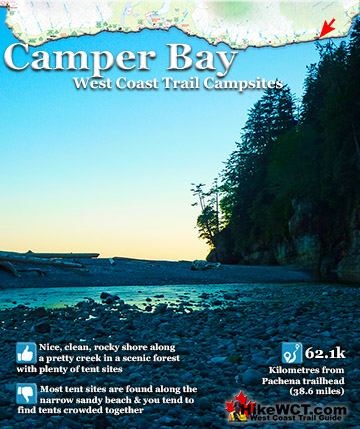
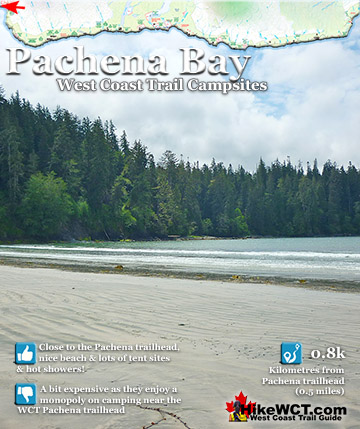
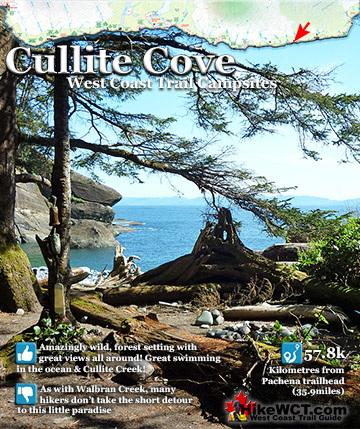
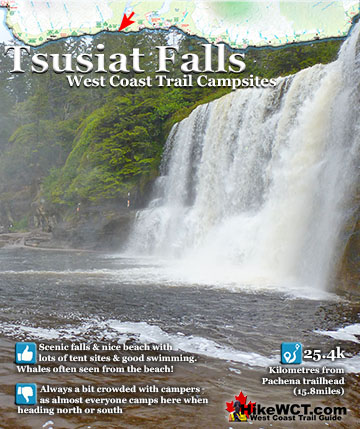
West Coast Trail A to Z
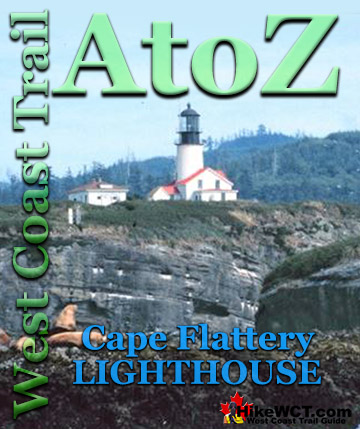
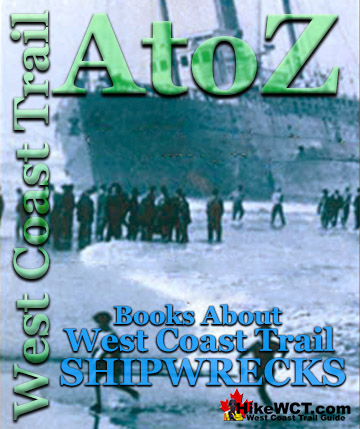
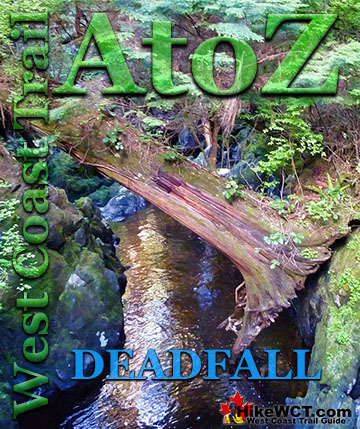
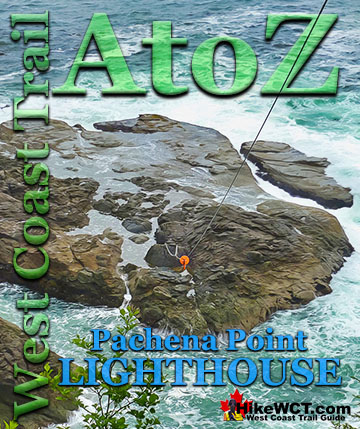
The West Coast Trail by Day
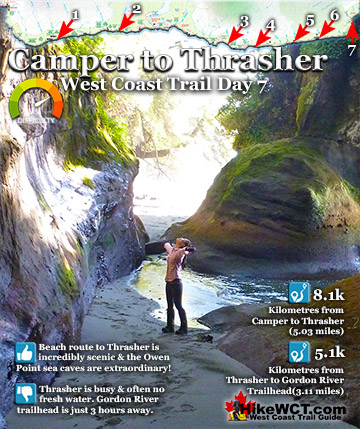
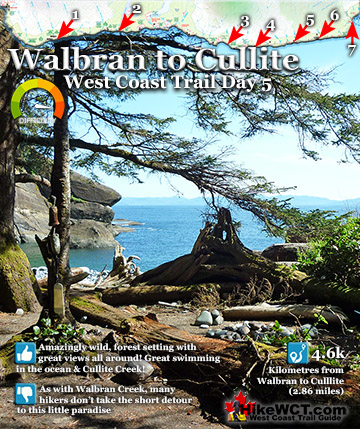
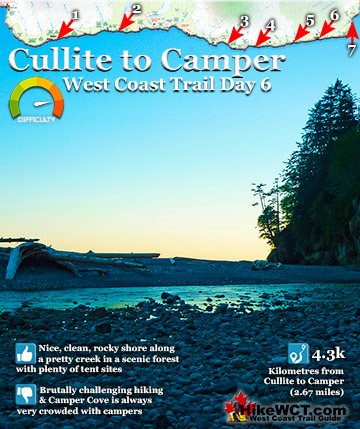
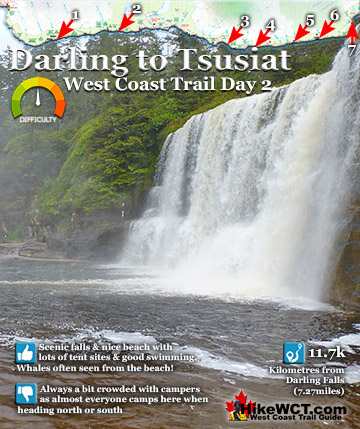
Explore BC Hiking Destinations!
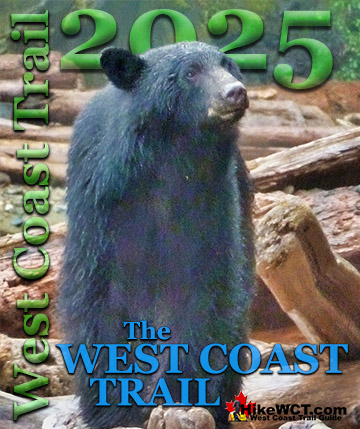
The West Coast Trail
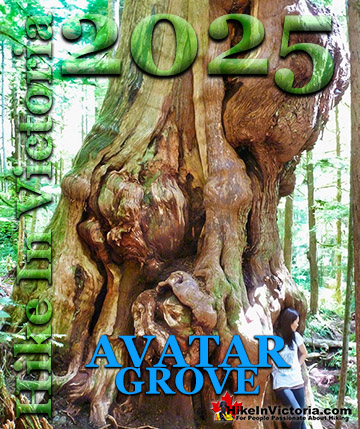
Victoria Hiking Trails
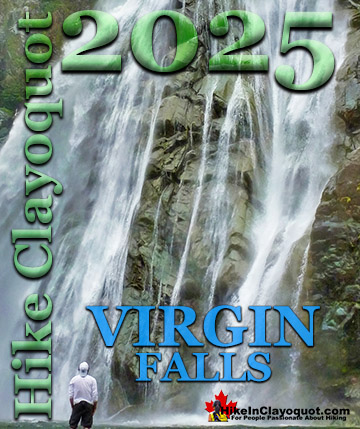
Clayoquot Hiking Trails
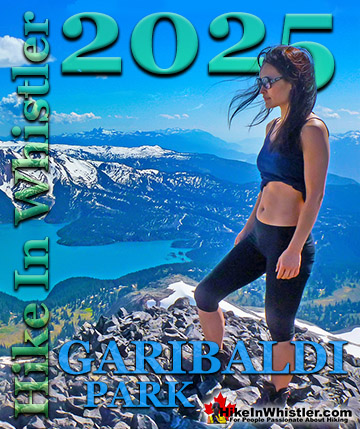
Whistler Hiking Trails
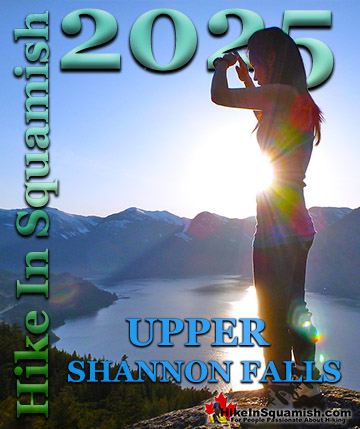
Squamish Hiking Trails

Vancouver Hiking Trails

